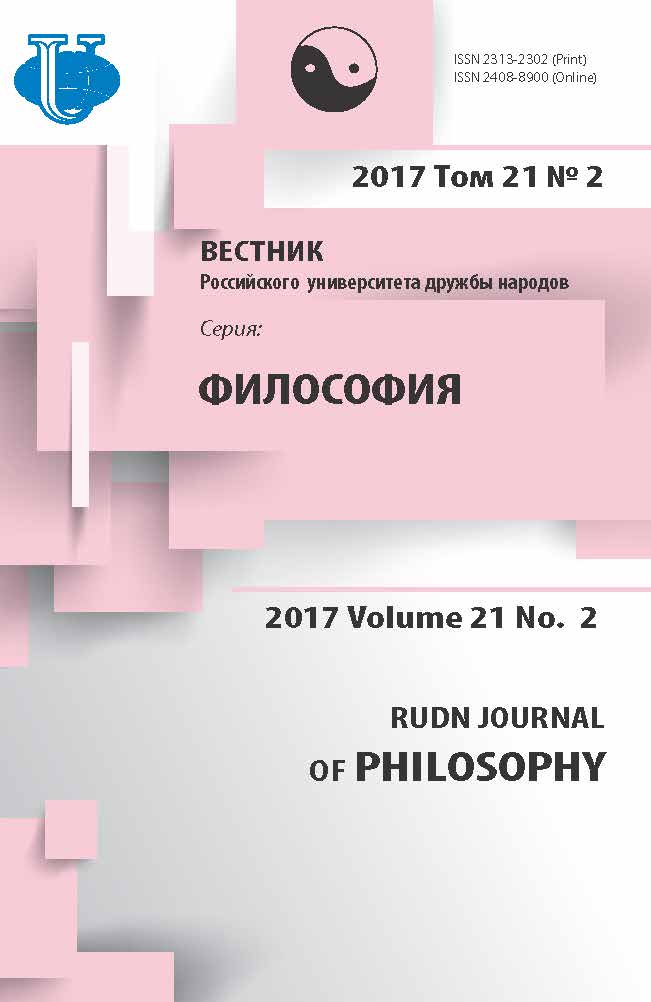Phenomenal and computational in the structures of consciousness
- Authors: Baryshnikov PN1
-
Affiliations:
- Pyatigorsk State Linguistic University
- Issue: Vol 21, No 2 (2017)
- Pages: 229-239
- Section: Articles
- URL: https://journals.rudn.ru/philosophy/article/view/16182
- DOI: https://doi.org/10.22363/2313-2302-2017-21-2-229-239
- ID: 16182
Cite item
Full Text
Abstract
This article focuses on the explanatory limits of the computational approach to the phenomenal consciousness. The principal aim is to analyze the methodological bounds of computational models regarding the content of the subjective phenomenal experience. Special attention is given to the correlation between the information theory and the semantic problems of natural language. We proceed from the assumption that the experience of usage of the linguistic sign, together with semiotic and narrative particularities of memory, is the real reason for the causal incompatibility in the mind-body problem. Cognitive processes are initiated to research the consistency between the results of “pure” experience and conceptual schemes. In this case, the computational models represent only one component of the organization of mental states and their descriptions. The reasonings mentioned in this article are based on the argument that it is solely natural language that is a connecting link between corporal organization of the subjective experience and narrative “additional reality” of the phenomenal states. The realization of the conceptual system, necessary for the formation of the subjective reality, arises from the permanent collation of the qualitative property of sensory experience (fixed in memory) with the content of communicative practices.
About the authors
P N Baryshnikov
Pyatigorsk State Linguistic University
Author for correspondence.
Email: ontology1@mail.ru
9, Kalinina prosp., Pyatigorsk, Stavropol territory, 357532, Russian Federation
References
- Block N. On a confusion about a function of consciousness. Behavioral and Brain Sciences. 1995; 18.
- Carruthers P. Phenomenal consciousness. Cambridge: Cambridge University Press; 2003.
- Alter TA. Phenomenal concepts and phenomenal knowledge. New York, Oxford: Oxford University Press; 2009.
- Chalmers D. Soznayushchij um: V poiskah fundamental'noj teorii. Moscow: URSS; 2013. (In Russ).
- Ivanov DV. Priroda fenomenal'nogo soznaniya. Moscow: Knizhnyj Dom “LIBROKOM”; 2013. (In Russ).
- Dubrovskij DI. Problema ideal'nogo. Sub"ektivnaya real'nost'. Moscow: Kanon+; 2002. (In Russ).
- Boden MA. Information, computation and cognitive science. In: Handbook of the philosophy of science. Philosophy of Information. Amsterdam [etc.]: Elsevier; North-Holland; 2008.
- Harremoes P. The quantitative theory of information. In: Handbook of the philosophy of science. Philosophy of Information. Amsterdam [etc.]: Elsevier; North-Holland; 2008.
- van Benthem J. The stories of logic and information. In: Handbook of the philosophy of science. Philosophy of Information. Amsterdam [etc.]: Elsevier; North-Holland; 2008.
- Kolmogorov AN. Teoriya informacii i teoriya algoritmov. Moscow: Nauka; 1987. (In Russ).
- Grünwald PD. Algorithmic information theory. In: Handbook of the philosophy of science. Philosophy of Information. Amsterdam [etc.]: Elsevier; North-Holland; 2008.
- Napalkov A. Mozg cheloveka i iskusstvennyj intellekt. Moscow: Izd-vo Mosk. un-ta; 1985. (In Russ).
- Moskovskij lingvisticheskij al'manah. Vypusk 1. Moscow: Shkola “YAzyki russkoj kul'tury”; 1996. (In Russ).
- Percov NV. O nekotoryh problemah sovremennoj semantiki i komp'yuternoj lingvistiki. In: Moskovskij lingvisticheskij al'manah. Vypusk 1. Moscow: Shkola “YAzyki russkoj kul'tury”; 1996. (In Russ).
- Vasil'ev VV. Soznanie i veshchi: Ocherk fenomenalisticheskoj ontologii. M.: Knizhnyj Dom “LIBROKOM”; 2014. (In Russ).
- Shamis AL. Puti modelirovaniya myshleniya. M.: Komkniga; 2005. (In Russ).
- Dubrovskij DI. Psihicheskaya prichinnost' kak vid informacionnoj prichinnosti i “kauzal'naya zamknutost' fizicheskogo”. Novainfo. 2011; (5). http://novainfo.ru/article/2305. (In Russ).
- Nagumanova SF. Soznanie kak fenomenal'naya reprezentaciya (ontologicheskie i metodologicheskie problemy reduktivnogo ob"yasneniya soznaniya). Moscow, 2013. (In Russ).
- Kravchenko AV. Ot yazykovogo mifa k biologicheskoj real'nosti: pereosmyslyaya poznavatel'nye ustanovki yazykoznaniya. Moscow: Rukopisnye pamyatniki Drevnej Rusi; 2013. (In Russ).
Supplementary files















